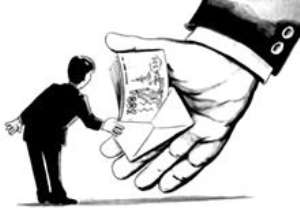
For whatever reason, judicial corruption has not featured much in the ongoing national debate on how to tackle corruption in our society. Luckily, the present call to the aspirants contesting the Presidency, to pay attention to judicial corruption is supported by comments made on October 24th, 2012, by the United Nations Special Rapporteur on the independence of judges and lawyers, Gabriela Knaul.
Gabriela Knaul warned that the existence of corruption in the judiciary remains a daunting challenge in many countries, and urged world governments to place the independence of judges, prosecutors and lawyers at the centre of their policies to prevent and fight corruption and to strengthen the rule of law and human rights.
Certainly, the recognition of a cross-cultural relationship between judicial corruption and the levels of corruption in democratic societies affirms what the Forum for Governance and Justice (FGJ) has propagated since it came into existence. Expectedly, the UN expert on this evil canker on 24 October 2012 noted during her address to the UN General Assembly that “the pervasiveness of corruption in the judiciary and the legal profession, whether one off or endemic, is very worrying because it directly undermines the rule of law and the ability of the judiciary to guarantee the protection of human rights”.
Ms Gabriela Knaul added that “a judiciary that is not independent can easily be corrupted or co-opted by interests other than those of applying the law in a fair and impartial manner”. “Strengthening the judiciary from within, as well as providing all the safeguards for its independence vis-à-vis other public officials and private actors, is essential in combating and preventing instances of judicial corruption”, she stated.
Indeed, the conclusion reached by the UN expert, that corruption in the judiciary has the potential to victimize those that do not have the means to play by the informal rules set by a corrupt system is evident in Ghana and is primarily accountable for the many victims of judicial corruption from across our nation Ghana, such as the Adu Kuranteng family, Mr. Kingsley Amoakwah and Mr. Kwame Adofo Akuamoah, who have come to the FGJ for help.
Therefore, as a responsible organisation working to help victims of judicial corruption, and in light of these supporting comments by the UN expert, it is justified to call on the Presidential Candidates to outline their plans towards dealing with judicial corruption. Among others, the FGJ has already called on the Chief Justice and the Judicial Council to:
1) Set up an independent enquiry inviting members of the public to submit complaints about corruption within the justice delivery system. Such a committee should include representation from key stakeholder including civil society organisations and should hold hearings in all regions of the nation. Those citizens of Ghana willing to come forward should be given immunity to encourage them to submit complaints about corruption within the judiciary.
2) Institute measures to ensure that corrupt Judges and Magistrates are duly punished. Judges and Magistrates who enrich themselves through corruption or the wrong channels should be prosecuted and not just dismissed or asked to resign.
The above suggestions, largely ignored, are in agreement with what the UN expert has outlined. She stated that, “mechanisms of accountability should be put in place to investigate acts of corruption and they should be developed with the full participation of the actors concerned”.
As Ms. Gabriela Knaul emphasized, and rightly so, judges, prosecutors and lawyers are in a unique position to tackle the wider phenomenon of corruption in other instances of the public and private sectors, and that “anti-corruption bodies should be established or developed to effectively assist judicial actors to combat corruption and to implement and strengthen transparency within the public sector”.
Clearly the judiciary has a central role to play in the fight against corruption in society. Thus, we cannot expect to make any gains in the war against corruption in our society when the judiciary itself is suffering from the same illness. Therefore, the focus on the judiciary is informed by the anticipated positive consequences of a less corrupt judiciary, which can be enhanced by exposing and punishing any acts of corruption in the judiciary.
It is therefore imperative that we acknowledge the need to tackle corruption in the judiciary as a pre-requisite to fighting corruption in our society. Let this article alert our aspirants for leadership and the good people of Ghana to a simple fact, that is, a serious fight against corruption must start with the institution that is supposed to hold us accountable, the judiciary.
Dr. Clement Abas Apaak
Convener, Forum for Governance and Justice - Ghana
Lecturer, University of Ghana, Legon
[email protected]




 Akufo-Addo commissions Phase II of Kaleo solar power plant
Akufo-Addo commissions Phase II of Kaleo solar power plant
 NDC panics over Bawumia’s visit to Pope Francis
NDC panics over Bawumia’s visit to Pope Francis
 EC blasts Mahama over “false” claims on recruitment of Returning Officers
EC blasts Mahama over “false” claims on recruitment of Returning Officers
 Lands Minister gives ultimatum to Future Global Resources to revamp Prestea/Bogo...
Lands Minister gives ultimatum to Future Global Resources to revamp Prestea/Bogo...
 Wa Naa appeals to Akufo-Addo to audit state lands in Wa
Wa Naa appeals to Akufo-Addo to audit state lands in Wa
 Prof Opoku-Agyemang misunderstood Bawumia’s ‘driver mate’ analogy – Miracles Abo...
Prof Opoku-Agyemang misunderstood Bawumia’s ‘driver mate’ analogy – Miracles Abo...
 EU confident Ghana will not sign Anti-LGBTQI Bill
EU confident Ghana will not sign Anti-LGBTQI Bill
 Suspend implementation of Planting for Food and Jobs for 2024 - Stakeholders
Suspend implementation of Planting for Food and Jobs for 2024 - Stakeholders
 Tema West Municipal Assembly gets Ghana's First Female Aircraft Marshaller as ne...
Tema West Municipal Assembly gets Ghana's First Female Aircraft Marshaller as ne...
 Dumsor is affecting us double, release timetable – Disability Federation to ECG
Dumsor is affecting us double, release timetable – Disability Federation to ECG
